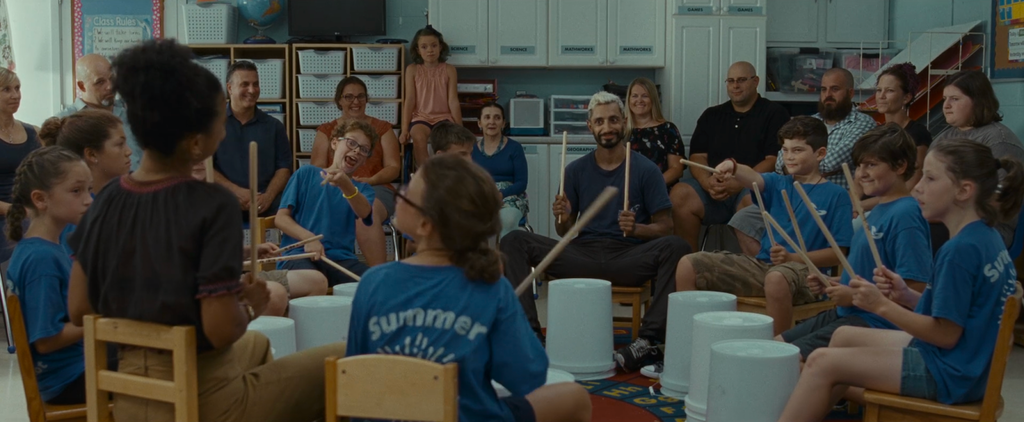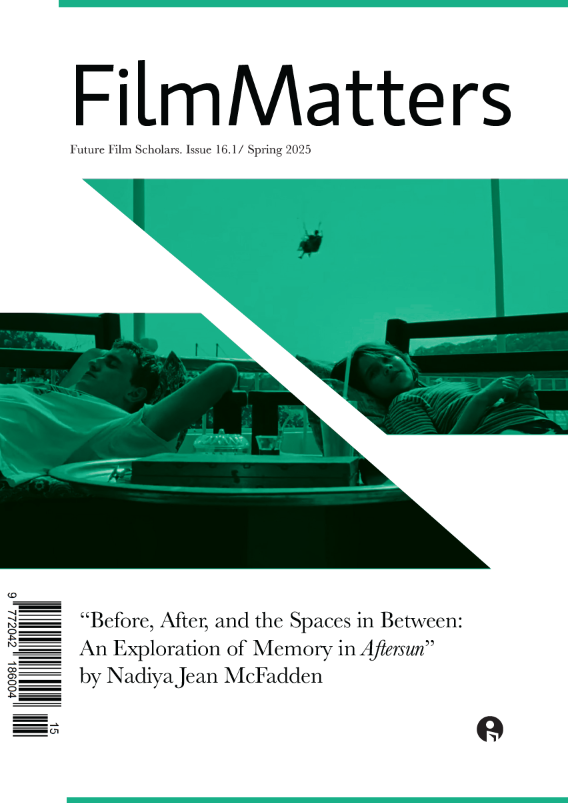
Film Matters: Please tell us about your article that is being published in Film Matters.
Alice Alonso Limongi: My article is called “Contradictions in Metal: a comparative analysis of Sound of Metal (2019).” It presents two ways of analyzing the film Sound of Metal (Darius Marder, 2019), which thematizes a heavy metal drummer who suddenly becomes Deaf. I analyze it through a textual and ideological lens when it relates to two of the film’s main themes: Deafness and mentorship. I then compare the two approaches, looking at how an ideological analysis directly contradicts the thesis of the film, which we can deduce through textual analysis.
FM: What research and/or methodologies do you incorporate in your article?
AAL: I used two methods of analysis. The first one is textual analysis, which, as the name suggests, involves looking at the actual text and deriving meaning from there. For me, that meant looking through the final sequence of the film and analyzing the shots. The second one is ideological analysis, which I used to look at casting choices made in the film, and how that contradicts the message that’s revealed in a textual analysis.
FM: Describe the original context for/when writing this article while an undergraduate student.
AAL: This article was born during my freshman year, in a Media Studies class taught by Professor Vonderheide, my faculty mentor. She had us pick any film we wanted and write mini-essays where we analyzed them through a specific lens. I picked Sound of Metal because it was — and still is! — one of my favorite films. I didn’t have the foresight to consider if there was actually something worth saying about Sound of Metal when it came to all these different analytical lenses. But I was pretty fortunate, because, as I wrote these mini-essays, I found out that there was actually a lot I wanted to discuss! For our final projects, we combined two of these mini-essays into one big one, and this is how this article came to be! It has gone through a lot of changes since then and, as I begin my junior year, it’s almost become something else entirely!
FM: What does your writing process look like?
AAL: The first thing I always do is go hunting for sources! After I read a lot, I start feeling like I have an okay grasp on what I’m going to say that’s new, as well as how the sources are going to fit in the text. I would love to say that I always outline, but sometimes I get too excited, and just start writing! This was the case with this article. And here, I also had the unconventional method of writing parts of the essay before I even knew it would be one, cohesive thing. They were mini-essays first, focusing on one interpretation of Sound of Metal, and then got Frankenstein-ed together — which was harder than I thought it would be! Then it was a lot of revising to make it sound nice and clean — and some complete rewrites along the way, as well! It wouldn’t be writing without that, would it?
FM: How have your personal experiences shaped and influenced your writing?
AAL: I think the main aspect of my personal life that has influenced my writing is that English is not my first language! Although I was fortunate enough to learn English at a young age, I’m Brazilian, and my mother tongue is Portuguese. I have only just moved to the US for college, and so my academic writing in English is still developing. I find that this makes my style a little different! Another big influence was my first-year writing course, with Professor Peter Medeiros. Both his teaching and the writing of my classmates has definitely changed the way I write — and for the better! And Professor Medeiros was the first to tell me you could actually publish an article as an undergraduate, so a lot of props go to him!
FM: What are your methods for finding diverse and relevant sources?
AAL: I think for that, it’s important to dive deep into whatever you’re researching. It’s no secret that marginalized voices are systematically excluded from conversations, and I don’t think it’s any different in academia. For this reason, it can be more difficult to find a source from an underrepresented community, but it doesn’t mean you should stop looking! I find that unconventional sources can be extremely relevant and often help uplift people whose voices are not being heard. Great places for this are personal blog posts, articles in small magazines, and even social media!
FM: Why is including marginalized voices in research important to you?
AAL: In the context of this article, it was very important to me to include as many Deaf sources as I could. I’m not Deaf myself, and I don’t think it’s right to discuss issues pertaining to a community without including its members. The consequences of not doing so are very harmful. In general, I think academia has been weaponized and used unjustly and cruelly against marginalized peoples. One way to rectify this violent past is to uplift voices from underrepresented communities in our academic writing. And also because marginalized people have important, relevant and interesting things to say — there is no reason they shouldn’t be heard.
FM: What aspects of the writing process were most challenging? Why?
AAL: As I mentioned, this article was originally a series of mini-essays written for a class project. So the hardest part was definitely summarizing and putting together all the ideas scattered throughout those papers. I thought it would be easier than it was!
FM: What’s a resistance point you hit in your writing, and how did you move past it?
AAL: I had a really tough time with the conclusion! I remember the deadline was approaching, and I was totally unhappy with how I was concluding the article. Trying to write the entire section from scratch was very difficult. In the end, I think I had to be nicer to what I already had written. I ended up incorporating some sections that I had already written and wrote around them instead of over them. That really helped! I also had a very, very hard time with the title. I had an awful first idea that survived for way too long, but thankfully I saw the error of my ways before I submitted the article!
FM: What do you enjoy most about your article?
AAL: I think my favorite thing about this article is actually a really small point I make. I describe the sound team’s use of audio in the film as a “tool of empathy.” It was really interesting to explore how the usage of sound lends itself to creating a closer bond between the protagonist and the audience. Plus, audio post-production is definitely my chosen area in film, and it was really nice to be able to appreciate these professionals’ hard work on Sound of Metal in an academic context.
FM: How has the Film Matters editorial and publication process impacted the development/evolution of your article?
AAL: Even just preparing to submit to Film Matters really changed the article, I think. I began seeing it as an independent work that could be read outside the context of the class it was written for. When I began the editing process, I think the fact that I knew this was going to be read by other people changed the game for me. I became more detail-oriented and wanted to make sure everything fit together as best as it could. The review comments I received were also super helpful and encouraging!
FM: What audience do you hope to reach with your Film Matters article and/or what impact do you hope it has on the field of film studies?
AAL: I really hope this brings Sound of Metal into the academic spotlight! There are definitely very good academic articles out there on Sound of Metal, but I still think we need more! Personally, I really enjoy the film, but from a scholarly perspective, there’s also a lot of merit here. I would love to see more work on it, especially from Deaf scholars and writers.
FM: How has your department and/or institution supported your work in film and media?
AAL: I feel very lucky to go to Emerson! It’s an awesome place for a film student who’s just starting out — I’ve felt very supported by students, faculty, and staff, alike. There’s a big focus on hands-on experience, so I’ve worked on a lot of sets, as well as in the post-production team for visual media projects. That has always been a blast and very important to my education! I also work at Emerson’s Audio Post-Production Lab, which has furthered my experience, to no end. And I’ve had the privilege of learning under incredible professors — especially Professor Vonderheide, my faculty mentor, Professor Medeiros, who encouraged me to publish in the first place, and Professor Amber Vistein, whose audio classes have taught me so much!
FM: How has your faculty mentor fostered your advancement as a film scholar?
AAL: Professor Vonderheide has been an invaluable part of my undergraduate experience. Although I’ve always wanted to publish an article, I find it very difficult to believe that I would have done so without her help. She believed in this paper from the very beginning and encouraged me every step of the way! Her comments on this article shaped it to what it is today, and her belief in me and my work has made all the difference! I hope to one day be a film scholar as able and patient as Professor Vonderheide!
FM: What advice do you have for undergraduate film and media scholars?
AAL: That’s a hard question! I feel like I’m still so young and inexperienced and, most of the time, it feels like it’s me who needs advice! But on a serious note, I think the most important part about the undergraduate experience is to take every opportunity that comes your way! Apply for everything and challenge yourself! You never know!
FM: What are your future plans?
AAL: I would love to continue my education and go to grad school! It’s always been in the back of my mind as something I’d like to do, especially because my education is very important to me. I would love to continue researching and writing about film and visual media, and I think that’s the best way for me to do so! It would also mean a lot to me if I could work in the film industry — I think hands-on experience is very important. I’m very big on audio post-production and would love to edit animation, one day!
Author Biography
Alice “Lila” Alonso Limongi is a Brazilian student at Emerson College, where she serves as the president of Emerson International. She studies Media Arts Production, with a concentration in Audio Production and a minor in Music History & Culture. Alice’s research focuses on language, sound, and identity in visual media.







































